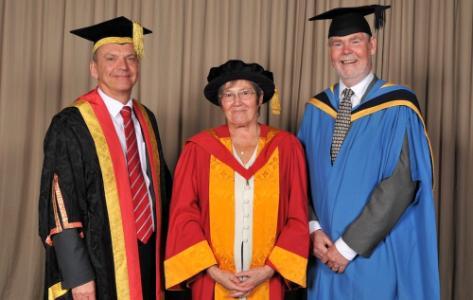Why UK international development assistance should not be cut
A blog post written by Professor Philip Dearden, Head of Centre for International Development and Training (CIDT) and Associate Dean (Research), Faculty of Arts, Business and Social Sciences (FABSS).
There are no grounds for breaking legal commitments or for turning our backs on countries and people at a time of great need.
News that the UK government is set to renege on its commitment to spending 0.7 per cent of gross national income on foreign aid could not come at a worse time for the world’s poorest countries and people and for international cooperation more broadly.

L:R Vice-Chancellor Professor Geoff Layer, Clare Short and Professor Philip Dearden
A few years ago, we in CIDT had the honour of presenting Clare Short for an honorary degree at the University of Wolverhampton https://cidt.org.uk/university-gives-an-honorary-degree-for-clare-short/ and https://cidt.org.uk/wp-content/uploads/2015/09/Clare-Short-FINAL-Encomium.pdf
It was Clare Short, when she was Minister of International Development, who set out a route map for the UK Government to spend 0.7 per cent of Gross National Income (GNI) target on international development assistance. This target was achieved in 2013 and is enshrined in law.
Until recently the moral, social and economic imperative for international Development Assistance that Clare Short outlined has been successfully maintained.
Now however the threat of change is very real with a proposal to reduce the 0.7 per cent to 0.5 per cent released last week. https://www.devex.com/news/boris-johnson-dodges-questions-on-uk-s-0-7-aid-commitment-98599 In the light of this proposal CIDT is amongst the 19 bodies that have signed the Development Studies Association statement urging the Government to maintain its commitment:
"News that the UK government is set to renege on its commitment to spending 0.7 per cent of gross national income on foreign aid could not come at a worse time for the world’s poorest countries and people and for international cooperation more broadly (UK aid budget facing billions in cuts, 17 November). The World Bank estimates that the Covid-19 pandemic will push an extra 88 to 115 million people into extreme poverty this year alone, rolling back years of progress that UK aid has helped contribute to. While there is room for debate about the best way to set aid budgets, there are no grounds for breaking legal commitments or for turning our backs on countries and people at a time of great need.
"Taken together with the parallel proposals to boost spending on national defence and to restrict employment within the Foreign, Commonwealth and Development Office to British nationals – which will greatly limit the talent pool from which to recruit and undermine FCDO’s ability to operate effectively in different contexts – this latest move suggests Britain is rapidly becoming a parochial rather than progressive presence in the world. The UK, with its reputation as a global leader on foreign aid and for scientific excellence in vaccine development and beyond, remains well placed to play a leading role in both responding to the pandemic and helping to build a more equal, safer and sustainable global order.
"The Development Studies Association (DSA) urges the government to maintain the 0.7 per cent commitment to aid spending, to playing a full role in supporting Covax (the vaccines pillar of the Access to Covid-19 Tools Accelerator) to ensure that developing countries do not suffer from vaccine nationalism, and to restating its commitment to the sustainable development goals."

Signatories
Prof Sam Hickey DSA president, Global Development Institute, University of Manchester
Prof Uma Kambhampati DSA secretary, Department of Economics, University of Reading
Prof Melissa Leach Institute of Development Studies, University of Sussex
Prof Kathryn Hochstetler Department of International Development, London School of Economics
Prof Khalid Nadvi Global Development Institute, University of Manchester
Prof Zoë Marriage Department of Development Studies, Soas University of London
Dr Elisa Van Waeyenberge and Dr Hannah Bargawi Department of Economics, Soas University of London
Prof Diego Sánchez-Ancochea Oxford Department of International Development, University of Oxford
Dr Jonathan Fisher International Development Department, University of Birmingham
Prof Laura Camfield School of International Development, University of East Anglia
Prof Michael Walls The Bartlett Development Planning Unit, University College London
Prof Alfredo Saad-Filho and Prof Susan Fairley Murray Department of International Development, King’s College London
Prof Philip N Dearden Centre for International Development and Training, University of Wolverhampton
Prof James Copestake Centre for Development Studies, University of Bath
Prof Prathivadi Anand Peace Studies and International Development, University of Bradford
Prof Dan Brockington and Prof Dorothea Kleine Sheffield Institute for International Development, University of Sheffield
Prof Jean Grugel Interdisciplinary Global Development Centre, University of York
Prof Alastair Ager Institute for Global Health and Development, Queen Margaret University, Edinburgh
Dr Namrata Bhattacharya-Mis International Development Studies, University of Chester
Dr Mei Trueba Global Health Department, Brighton and Sussex Medical School
Dr Grace Carswell Head of International Development, University of Sussex
For more information please contact the Corporate Communications Team.


/prod01/wlvacuk/media/departments/digital-content-and-communications/images-2024/Diane-Spencer-(Teaser-image).jpg)
/prod01/wlvacuk/media/departments/digital-content-and-communications/images-18-19/220325-Engineers_teach_thumbail.jpg)
/prod01/wlvacuk/media/departments/digital-content-and-communications/images-2024/240509-Menopause-Research-Resized.jpg)
/prod01/wlvacuk/media/departments/digital-content-and-communications/images/Maria-Serria-(teaser-image).jpg)
/prod01/wlvacuk/media/departments/digital-content-and-communications/images-2024/241014-Cyber4ME-Project-Resized.jpg)
/prod01/wlvacuk/media/departments/digital-content-and-communications/images-2024/240315-Research-Resized.jpg)
/prod01/wlvacuk/media/departments/digital-content-and-communications/images-2024/BDA-group-photo.jpg)